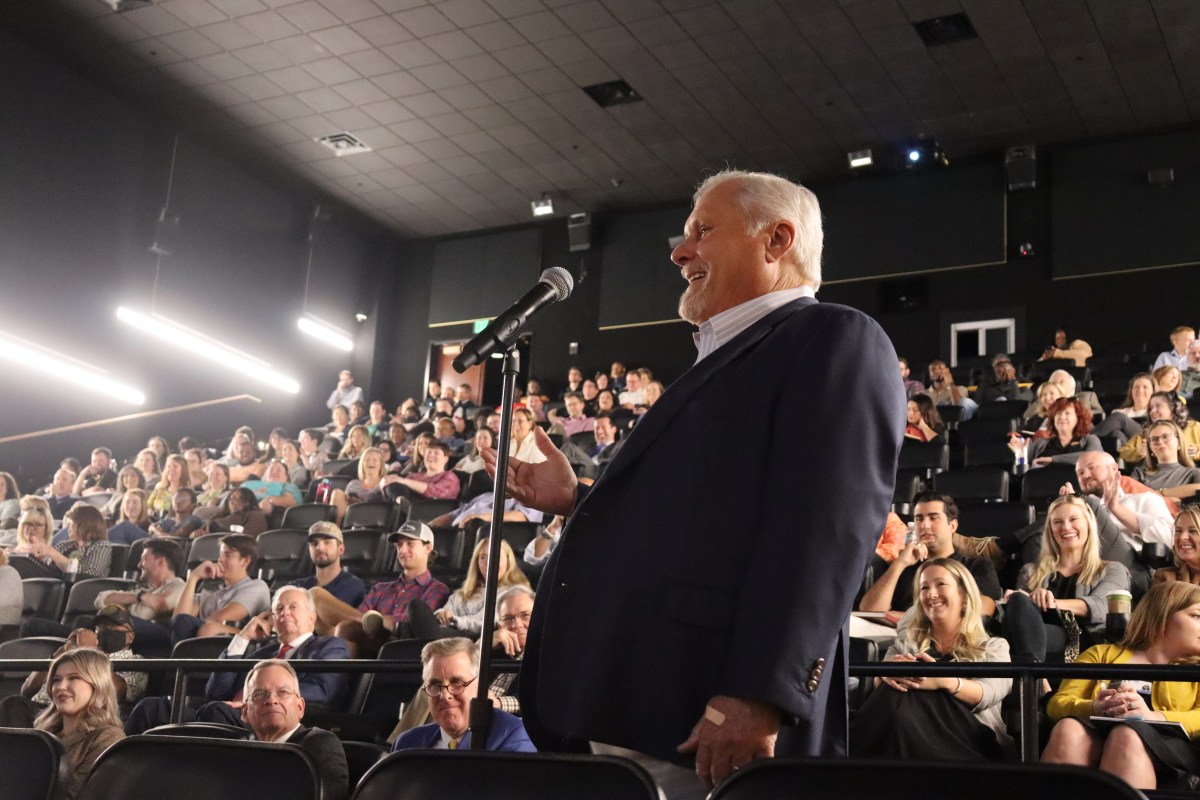Mississippi Today
A USM student spoke out about a candidate for provost. Then they got an email from one of the school’s biggest donors.

A USM student spoke out about a candidate for provost. Then they got an email from one of the school's biggest donors.
The unsolicited email arrived in Emily Goldsmith's inbox shortly before 6 p.m. on April 12 with a subject line that was short and to-the-point: “provost protest.”
Goldsmith, a graduate student at the University of Southern Mississippi, had recently been critical in the student newspaper about a growing controversy on campus: One of the finalists for provost — an administrator and finance professor named Lance Nail — had a checkered past at a former employer, Texas Tech University. A Title IX investigation found Nail reportedly mishandled a report of sexual misconduct and “failed in his responsibility as the Dean of the College.”
The news touched a nerve on campus where students had called on the university to adopt a zero-tolerance policy toward sexual assault a year and a half ago. More than 750 students, faculty and alumni signed a petition protesting Nail's possible hiring. Goldsmith, whose pronouns are they/them, just so happened to be the only student quoted in the student newspaper. Still, they knew they were speaking for many when they said that hiring Nail “would communicate that all the university's claims about diversity, inclusion, and equity were meaningless platitudes.” And, they began helping to plan a protest.
Days later, the email came through.
“You do not know me but my name is Chuck Scianna and I am the guy that Scianna Hall is named after,” it began.
Goldsmith knew of Scianna. The 93,000-foot building that bears his name in gleaming gold font faces U.S. Highway 49, a major thoroughfare in Hattiesburg. Scianna, an alumnus and co-founder of a major distributor of oil pipeline products, also happens to be one of USM's largest individual donors along with his wife, Rita, having given more than $10 million. He is also “lifelong friends” with USM's new president, Joe Paul.
But Goldsmith didn't know why Scianna cared about their protest.
In the email obtained by Mississippi Today, Scianna wrote that he knew Goldsmith was planning to protest but asked them to consider that USM had hired a search firm, created a search committee and instituted a “process” to vet the candidates for provost and still, Nail had become a finalist.
“If you are going to protest the interviewing of Dr. Nail, should you not protest Dr. Paul and the search committee, the search firm and everyone else involved in the selection process,” Scianna wrote. “Should we just turn the university over to you and your group to hire the provost and run the university?”
In his 48 years of business, Scianna wrote, he had been accused of “many things that were not even close to the truth.” He suggested there was more behind the news articles about Nail, who he noted he had worked with “in the past.”
“I am not advocating that you should not have a voice, but it should be peaceful and armed with the facts, not just a google search,” he wrote, adding “I believe that if you have a conversation with him before you rely only on a google search you might have a different opinion.”
“You are completing a PhD,” he concluded. “Don't you have to have an open mind to get the best out of an education? Does your program allow you to get all of your research facts from one source? I am only asking that you go into this with an unbiased opinion of Dr. Nail and let the process pick the best candidate.”
USM did not return a comment by press time, but Scianna's email offers a look at how university donors in Mississippi, who have extraordinary access to powerful administrators, view the role of community feedback in the largely confidential search-and-selection process of key university hires. It also speaks to whose voices get results from university administration.
Goldsmith felt shaken and intimidated by Scianna's email.
“I do think it's troublesome to discount the students who are saying they have feelings about this,” Goldsmith said. “This is their campus. Even if we're going to say ‘majority rules,' nobody has made a petition to say that we should hire Lance Nail, so it's not like there's this loud opposite voice.”
Goldsmith didn't reply to Scianna and forwarded the email to their dissertation advisor — their immediate superior — who then sent it up the chain. Scianna's email soon started circulating among faculty before it ultimately made its way to Chris Winstead, the dean of the College of Arts and Sciences.
Troubled by the message, Winstead texted and called Paul about it, according to another email shared with Mississippi Today.
“I do think that there is a power dynamic at play,” Goldsmith said. “Perhaps it would not have been unusual if I had had prior overlap (with Scianna) or conversations or a personal connection or even perhaps if I was in the College of Business.”
Scianna told Mississippi Today that he was just trying to offer Goldsmith some advice — not telling them not to protest. “Read the email. It's very clear. There's no threat,” he said.
“The higher up you get in any organization, you're more susceptible to people finding fault with what you do, finding fault with your decisions and then the narrative gets misconstrued — a lot of times by the media, to be honest, because they don't go out and get all the facts or look at both sides,” he said.
The controversy started earlier this month after USM announced that Nail was one of four finalists for provost, the university's chief academic officer. Students at USM promptly dug into his history — and had concerns about what they found.
Nail became dean of Texas Tech's business college in 2012, after spending four years at USM's College of Business. In 2015, Nail let go of a business school professor, reportedly a friend of his, who had been accused of sexual misconduct, according to KCBD. But the Title IX investigation, which Nail said had “inaccuracies,” found that he still invited the former business professor to a university trip to Chile, where the professor harassed a female student.
Later that year, Nail resigned from Texas Tech after the university determined he had broken its grading policies.
Nail, who was visiting the USM Gulf Park campus on Monday, didn't return an inquiry from Mississippi Today before press time. In a comment to SM2, the student newspaper, Nail wrote that “the many Southern Miss colleagues I worked with” could attest to his character, particularly his former students and “those who served on the Business Advisory Council who supported my mission to graduate ethical business leaders from Southern Miss.”
Scianna told Mississippi Today that he is one of those colleagues who served on USM's Business Advisory Council, which advises the dean of the business college. He said he worked closely with Nail, reviewing the college's curriculum to see how it “would be beneficial to my company” and recruiting students for internships or non-profit projects that he declined to share more details about.
But perhaps the biggest project Scianna and Nail collaborated on was the construction of Scianna Hall, a more than $30-million project. At the time, Scianna's $6-million donation was the USM Foundation's largest one-time gift from an alumnus.
As dean, Nail had a key hand in stewarding the campaign to build the business school. He lists the project as one of his significant professional accomplishments on the first page of his resume.
“He didn't just walk in one day and say ‘Will you write a check?'” Scianna said.
After Nail left USM, Scianna said the two stayed “acquaintances.” He said he didn't recommend Nail for the position or express a preference for Nail to anyone on the search committee.
“I'm not impartial,” he said. “I want the very best candidate, but I want the process to work out. My email to Emily has nothing to do with Lance Nail. It's with the way that it's being approached. … Don't make your decision based on Google searches.”
Scianna has served on search committees for key hirings at USM before, most recently last year when he was on the committee convened by the Institutions of Higher Learning Board of Trustees to select the university's next president. When it comes to the hiring process, he said that unlike the majority of students, faculty and alumni, the search committee has access “to all the facts.”
“Shouldn't their decision weigh more?” he said. “I mean, we don't like chocolate ice cream. Let's have a protest. Should we ban chocolate ice cream? Should we have the facts? And that's all I'm saying.”
He said he wasn't sure what a protest — no matter how large — could accomplish when the university ultimately makes a hiring decision based on the help of the search committee and the headhunting firm.
“What if a thousand people got together and said your newspaper was dishonest, didn't report the truth?” he said. “Should there be an investigation? You know, I don't know. That's, that's, I'm just not smart enough, I guess, to figure that out.”
USM's provost 13-person search committee does include two student voices — the SGA presidents of the Hattiesburg and Gulf Park campuses — but Goldsmith said the process should be more transparent so that all students can be heard. They suggested the university share the steps that were taken to vet Nail before he became a finalist.
And while they don't plan to ask Nail any questions when he visits campus Tuesday, they will attend the protest they helped organize in USM's designated free speech zone in the middle of campus.
“I do think generally that undergrad and graduate students should be made more aware of administrative hiring,” they said. “There isn't always a ton of transparency in higher education. Sometimes students don't even know to look at this stuff … but I have learned through this process that many undergrad students do care. They're not thoughtless, they're not uninvolved. They are thinking, they are thoughtful, they are involved.”
Scianna, who is back in his office in Waller, Texas, after visiting Hattiesburg this weekend, doesn't plan to see the protest for himself because his philanthropy shows his dedication to USM.
“I don't have to be part of this,” he said. “They can do what they want to do. I mean, talk, beat your drum, do whatever. But let your actions speak for yourself.”
This article first appeared on Mississippi Today and is republished here under a Creative Commons license.
Mississippi Today
Legislation to strip key power of PERS Board passes both chambers
Legislation that strips significant power from the board that governs the state's public employee pension program has passed both chambers of the Legislature.
Under the legislation set to go to Gov. Tate Reeves during the final days of the 2024 session, the Public Employees Retirement System Board would no longer have the authority to increase the contribution rate levied on governments (both on the state and local level) to help pay for the massive retirement system.
The legislation, which passed both chambers in recent days, was a reaction to the decision by the board to increase by 5% over a three-year period the amount local governments contribute to each employee's paycheck for their retirement. Under the PERS Board plan, the employer contribution rate would have been increased to 22.4% over three years, starting with a 2% increase on July 1.
The board said the increase was needed to ensure the long-term financial stability of the system that pays retirement benefits for most public employees on the state and local levels, including staff of local school districts and universities and community colleges.
City and county government officials in particular argued that the 5% increase would force them to cut government services and lay off employees.
Under the bill passed by the Legislature there still would be a 2.5% increase over five years — a .5% increase in the employer contribution rate each year for five years.
In addition, legislative leaders said they plan to put another $100 million or more in state tax dollars into the retirement system in the coming days during the appropriations process.
Under current law, the PERS Board can act unilaterally to increase the amount of money governmental entities must contribute to the system. But under the new bill that passed both chambers, the board can only make a recommendation to the Legislature on increasing the employer contribution rate.
The PERS Board also would be required to include an analysis by its actuary and independent actuaries on the reason the increase was needed and the impact the increase would have on governmental entities.
In the 52-member Senate, 14 Democrats voted against the bill. Only one House member voted against the proposal.
Sen. David Blount, D-Jackson, said the bill failed to address the financial issues facing the system. He said a permanent funding stream is needed.
Blount said, “You are moving in the wrong direction and weakening the system” with the bill the Legislature approved. “Is it painful? Is it going to cost more money? Yes, but we need to do it” to fix the system.
The system has assets of about $32 billion, but debt of about $25 billion. But Sen. Daniel Sparks, R-Belmont, and others argued that the debt was “a snapshot” that could be reduced by strong performance from the stock market. The system depends on its investments and contributions from employers and employees as sources of revenue.
The system has about 360,000 members including current public employees and former employees and retirees.
The legislation states that no changes would be made for current members of the system. The legislation does reference looking at possibly changing the system for new employees. But that would be debated in future legislative sessions.
The bill does not include an earlier House proposal to dissolve the PERS Board, which consists primarily of people elected by the members of the system, and replace them with political appointees.
This article first appeared on Mississippi Today and is republished here under a Creative Commons license.
Mississippi Today
A solution to the Republican impasse on Medicaid expansion
Kathleen O'Beirne knocked loudly on Sen. Kevin Blackwell's office door in the basement of the Mississippi State Capitol on Saturday morning.
O'Beirne, a Ridgeland resident and mother of two boys, has been closely tracking the back-and-forth debate on Medicaid expansion, which Blackwell, as chairman of the Senate Medicaid Committee, is leading for the Senate. She and a group of other concerned citizens simply wanted a word with the Republican leader.
But there was no answer at the door, and there would be no conversation. So O'Beirne and the others took blank sheets of copy paper and began writing letters. When they finished writing, they taped the letters to Blackwell's door.
“I'm here because of the human cost of not expanding health care coverage to poor Mississippians,” O'Beirne said outside Blackwell's office. “But I'm also here because I'm a taxpayer. And I see that our senators are about to pass up literally billions in federal tax dollars that you and I and most other Mississippians already pay. We have the chance to bring all of that money back to the state of Mississippi, but we're about to walk away from it for no good reason.”

As O'Beirne and other Mississippians have closely followed, Blackwell has been as dug-in as any lawmaker during the Medicaid expansion fight. This week, after agreeing to hold public conference committee meetings to debate Medicaid expansion, he refused to meet a second time with his House counterparts. He has seldom engaged with House Republican leaders in private, either.
He did, however, choose to speak to a gaggle of reporters on Friday after the Senate sent a compromise plan to the House for consideration. In the interview, he drew hard lines against any additional compromise with the House, specifically around a work requirement, and even doubted whether his own plan had the necessary support from his Republican Senate colleagues.
READ MORE: Blackwell says Senate won't budge on Medicaid work requirement
Blackwell and some Republican senators have long maintained that any expansion deal must include a requirement that Medicaid recipients work, which is a conservative policy desire that the federal government has struck down in 13 previous expansion states. Including a stringent work requirement, health care advocates and legal scholars believe, would effectively kill any expansion plan.
But in the plan the Senate put forward on Friday, they would still mandate the requirement. It would also force the state's attorney general to sue the feds over any rejection and hope that a conservative 5th Circuit Court of Appeals allows the work requirement to go into effect. Unless a work requirement was granted by either the federal Medicaid agency or the federal courts, expansion could not go into effect under the Senate plan.
READ MORE: The unlikely Mississippi politician who could tank Medicaid expansion
However, an earlier House proposal also included a work requirement but would allow expansion to go into effect if the state could not convince the federal government to allow it. House leaders have not yet publicly responded to the Senate plan they received on Friday, but the work requirement piece has been the main topic of deliberations on that side of the building.
The House and Senate Republican remained at an apparent impasse as of midday Saturday and adjourned for the day without giving any public updates on expansion negotiations. Both chambers were working into the evening Saturday and will work again Sunday to hammer out final agreements on a $7 billion state budget.
None of that sat right with O'Beirne, inspiring her to come back to the Capitol on Saturday and make the unannounced visit to Blackwell's office. When asked what message she was trying to deliver to Blackwell, she said: “Well, a compromise.”
O'Beirne then summed up what she wrote in her note to Blackwell:
“I'm a recovering lawyer, so I'm used to resolving litigation. I think there's a very obvious compromise that the Senate and the House could come to if they were willing to do the work.
My suggestion is to keep the Senate's work requirement. Keep the provision that says if CMS kicks back the work requirement, then the AG has to sue the feds. But also, keep the House provision that will allow Medicaid expansion to go into full effect, even if CMS kicks back the work requirement.
So you go on and you start pulling down those billions of federal dollars that help the state and people get health care coverage. Then in the meantime, let the lawyers and government officials sort out the work requirement business. To me, that's a win-win-win.
Now, I'm sure Lt. Gov. Hosemann, Sen. Blackwell and other leaders are mulling that over. Maybe they've already had that thought. To me, it's such an obvious compromise that takes full advantage of our tax dollars. It's not wasting our tax dollars. It's helping communities. It's helping hospitals. It's helping doctors. It's helping needy patients. It is just an all around win that I sure hope they can get to.”
Kathleen O'Beirne
Such a compromise would require some careful drafting of the legislation, experts say, and whether it checks enough boxes for Blackwell and the hard-line senators is anyone's guess. But O'Beirne, a self-described “pragmatist,” felt led to share it with Blackwell on Saturday.
“I really do think there's a path here,” O'Beirne said. “It seems like a very simple solution right under our noses that Senate leaders are about to pass up. How frustrating would it be to come all this way to get nothing?”
This article first appeared on Mississippi Today and is republished here under a Creative Commons license.
Mississippi Today
Lawmakers send MAEP education funding formula rewrite to governor
A new school funding formula has been approved by the Legislature that, like the long-standing Mississippi Adequate Education Program, will rely on an objective mechanism to determine how much state funding is needed to operate schools.
The push to replace MAEP has been one of most contentious issues facing legislators in the final days of the 2024 session. There have been efforts for years to replace the formula by those who say the state could not afford it.
On Saturday the 52-member Senate with three dissenting votes passed on to the governor a compromise proposal to replace MAEP. The House had unanimously passed it late Friday.
“The whole point of us doing this is to make certain our school districts are treated as fairly and as best we could,” said House Education Chair Rob Roberson, R-Starkville. He said the new formula will provide additional money for poor districts and for low-income and special-needs students.
Roberson's original bill did not include an objective funding formula, which had been the hallmark of MAEP. Senate Education Chairman Dennis DeBar, R-Leakesville, who was reluctant to rewrite MAEP, finally acquiesced, but was insistent that any rewrite include an objective formula that took out of the hands of politicians – namely legislators – the amount of money needed for the operation of local school districts.
On Saturday, DeBar told senators that if the Senate had not insisted on an objective funding formula, the Legislature could have “willy nilly” decided the level of education funding.
“This formula will allow for predictability over time. Whereas the House bill did not,” DeBar said. “It (the House plan) was a one-year thing where the Legislature could come in and decide to increase or decrease funding for education. This will hold our feet to the fire in the Legislature and ensure our schools are funded.”
House Education Vice Chairman Kent McCarty, R-Hattiesburg, told House members that the objective funding formula made the original House proposal stronger.
“I think this is a good addition to the bill,” he said. Like MAEP, the formula will be recalculated every four years and in the intervening years there will be an inflation factor added to the funding.
Under the new formula, schools will receive per student the average teacher salary divided by 14, which represents the average student-teacher statewide ratio. In addition schools will get another 20% of that amount for administrative costs, 30% for ancillary costs and money for operations and maintenance based on the three-year, per-square-foot average of the school district's operations and maintenance costs.
On top of that, the school districts will receive additional funds for students in certain categories, such as for special-education students, those living in poverty, or living in areas of high poverty and for students who do not speak English as their primary language. The additional money provided to categories of students was a key component of the original House bill.
Like MAEP, local school districts will be required to pay a portion of the cost. But wealthier districts will be required to pay more than districts with a smaller local property tax base. No district will be mandated to pay more than 27% of the cost.
Sen. Hob Bryan, D-Amory, one of the architects of MAEP in 1997, was one of the three no votes.
While Bryan said there appeared to be good features to the new funding plan, more time was needed to study it.
“It is simply not possible to enact a funding formula for public education in this legislative session where we know what we are doing,” he said. “We don't have enough time for people to look at the new proposal, consider alternatives.”
Bryan pointed out that if MAEP was unpredictable for school districts it was because of the Legislature's refusal to fully fund it. He said it is possible – even likely – that the same will occur with the new formula.
MAEP had language saying the formula “shall” be fully funded, But the full funding mandate was ignored every year since the program was fully enacted in 2003 except for twice.
Under the first year of the new formula, which goes into effect with the beginning of the new fiscal year on July 1, K-12 education is supposed to receive an additional $230 million.
The additional funding will bring the education budget to $2.94 billion – about $50 million less than MAEP would have provided if fully funded.
DeBar said that based on inflation it will take about $50 million more in funds to fully fund the new formula next year.
The new formula will be called simply the Mississippi Student Funding Formula.
Sen. Angela Hill, R-Picayune, voted against the proposal because she feared that like MAEP the new formula would make a commitment over time the state could not afford. Plus, she said she was concerned about the money going to educate students who spoke English as a second language. Hill said she wanted more details on that feature of the bill.
This article first appeared on Mississippi Today and is republished here under a Creative Commons license.
-
Local News3 days ago
Sister of Mississippi man who died after police pulled him from car rejects lawsuit settlement
-
Mississippi News7 days ago
2 dead, 6 hurt in shooting at Memphis, Tennessee block party: police
-
Mississippi Today3 days ago
At Lake High School in Scott County, the Un-Team will never be forgotten
-
Mississippi News7 days ago
Forest landowners can apply for federal emergency loans
-
Mississippi News22 hours ago
One injured in Mississippi officer-involved shooting after chase
-
Mississippi News5 days ago
Cicadas expected to takeover north Mississippi counties soon
-
Mississippi News5 days ago
Viewers make allegations against Hatley teacher, school district releases statement – Home – WCBI TV
-
Mississippi News7 days ago
Nationwide health alert issued for ground beef over potential E. coli risk


































